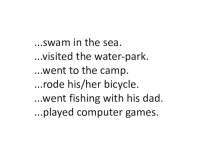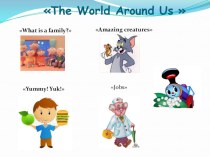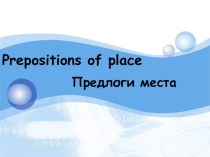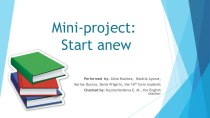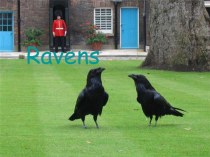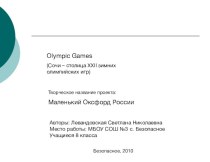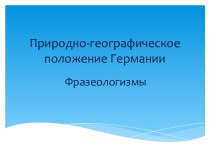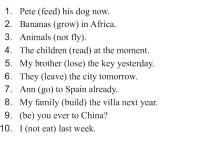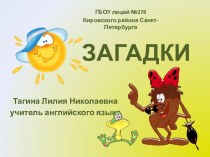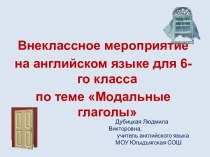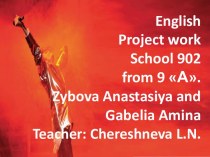- Главная
- Разное
- Бизнес и предпринимательство
- Образование
- Развлечения
- Государство
- Спорт
- Графика
- Культурология
- Еда и кулинария
- Лингвистика
- Религиоведение
- Черчение
- Физкультура
- ИЗО
- Психология
- Социология
- Английский язык
- Астрономия
- Алгебра
- Биология
- География
- Геометрия
- Детские презентации
- Информатика
- История
- Литература
- Маркетинг
- Математика
- Медицина
- Менеджмент
- Музыка
- МХК
- Немецкий язык
- ОБЖ
- Обществознание
- Окружающий мир
- Педагогика
- Русский язык
- Технология
- Физика
- Философия
- Химия
- Шаблоны, картинки для презентаций
- Экология
- Экономика
- Юриспруденция
Что такое findslide.org?
FindSlide.org - это сайт презентаций, докладов, шаблонов в формате PowerPoint.
Обратная связь
Email: Нажмите что бы посмотреть
Презентация на тему The morphological structure of english words and word-building in english. (Lecture 3-4)
Содержание
- 2. What do you remember from the previous part?Morphemes: Roots, affixes: prefixes, suffixes, infixes.Affixation:PrefixationSuffixation
- 3. 1. Conversion (zero derivation)is making a new
- 4. ConversionNoun-verb conversionHe elbowed his way through the
- 5. ConversionVerb-noun conversionHe was admitted to the university
- 6. ConversionVerb-noun conversionPhrasal verb-noun conversion
- 7. ConversionAdjective-noun conversion1. Partial conversionDenoting a quality or
- 8. ConversionAdjective-noun conversion2. Complete conversionA native, two natives,
- 9. 2. CompoundingCompounding or compositionis a word-formation process
- 10. CompoundingType of composition:Solid (without linking elements): bedtime,
- 11. CompoundingStructure of the compounds:1) two simple stems:
- 12. 3. Shortening (Clipping or Curtailment)Types of shortening
- 13. ShorteningClipped words can be of different types:ad=advertisementexpo=expositionphone=telephonepro=professionalmemo=memorandumtec=detectiveheli or copter=helicoptercomfy=comfortable
- 14. Shortening2) initialisms (инициальная аббревиатура): a type of
- 15. ShorteningexamplesIOC=International Olympic CommitteeBBC=British Broadcasting CorporationISBN=International Standard Book NumberCAD=computer assisted designcm=centimeterTB=tuberculosis
- 16. ShorteningexamplesBasic=Beginner’s All-purpose Symbolic InstructionTEFL=teaching English as a
- 17. Shorteninggymnasium dormitory handkerchief gasoline kilogram influenza business
- 18. ShorteningCPUDIYCEOITAISOSIDDGMTVIPP.S.a.m. p.m.central processing unitDo it yourselfChief Executive
- 19. 4. Backformation (Обратное словообразование)Back-formation is a process
- 20. BackformationExamplesedit from editorautomate from automationenthuse from enthusiasmgloom from gloomydonate from donationbrainwash from brainwashingsleep-walk from sleep-walking
- 21. 5.Blending КонтаминацияBlending is a process of word-formation
- 22. BlendingExamplesnewscast (news+broadcast) brunch (breakfast+lunch) smog (smoke+fog) talkathon (talk+marathon) slimnastics (slim+gymnastics) videophone ( video +telephone)
- 23. Blendingsci-fihi-fiworkaholicstagflationUnicomsitcommoteldawkscience+fiction high+fidelity work+alcoholic stagnation+inflation United + Communicationssituation+comedymotor+hoteldove+hawk
- 25. Reduplication (Repetition) consists in a complete or
- 26. Ellipsis is the omission of a word
- 27. Non-productive ways of word-buildingSound interchange :vowel-interchange (to
- 28. Скачать презентацию
- 29. Похожие презентации
What do you remember from the previous part?Morphemes: Roots, affixes: prefixes, suffixes, infixes.Affixation:PrefixationSuffixation
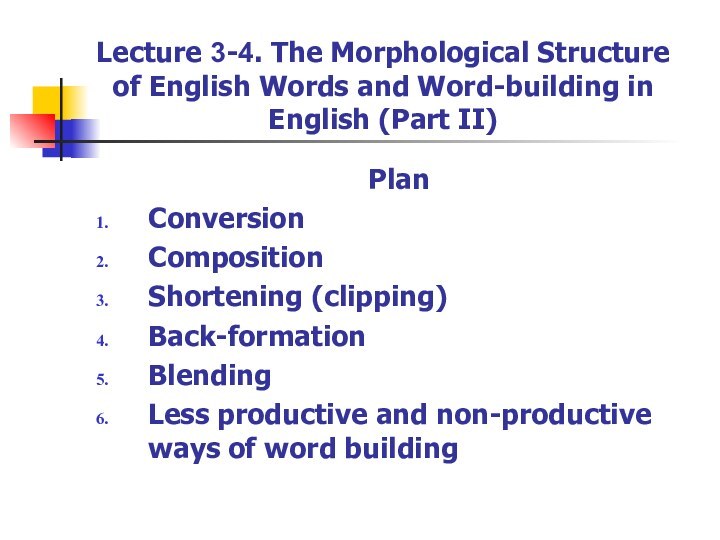

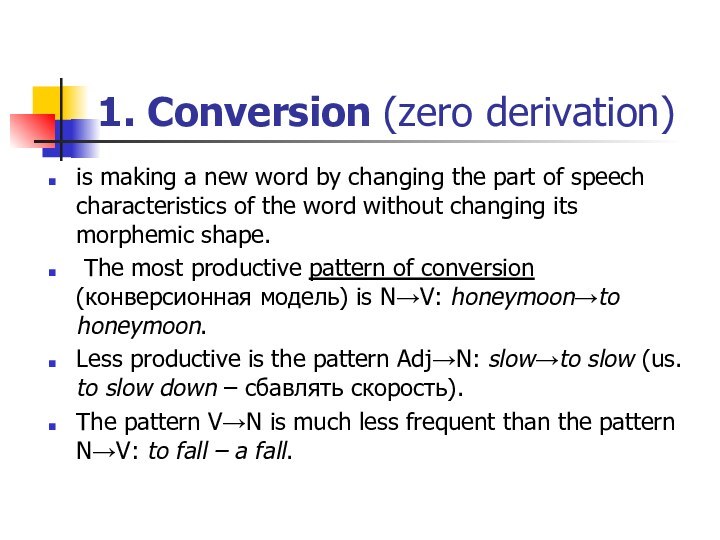


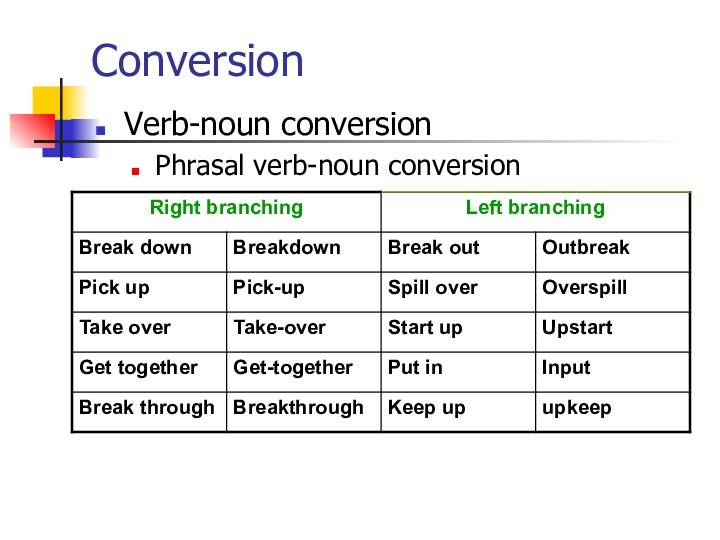


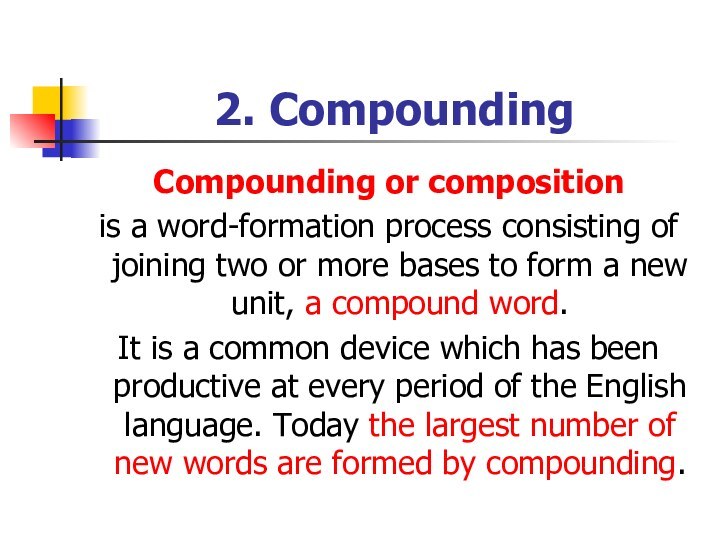
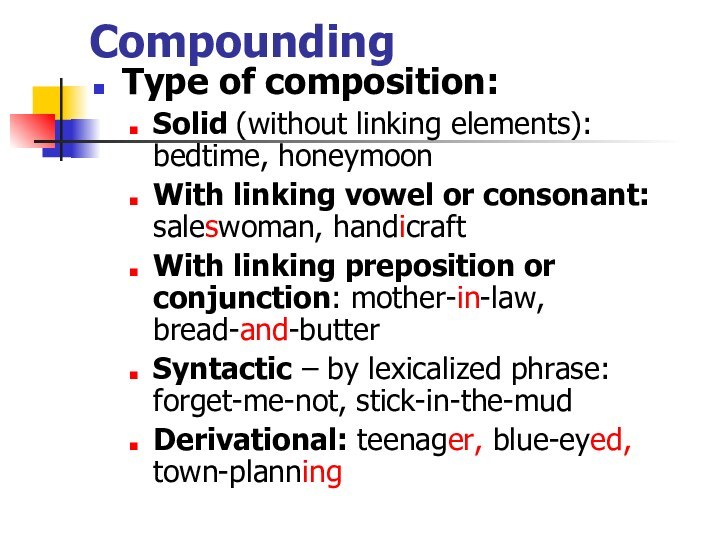



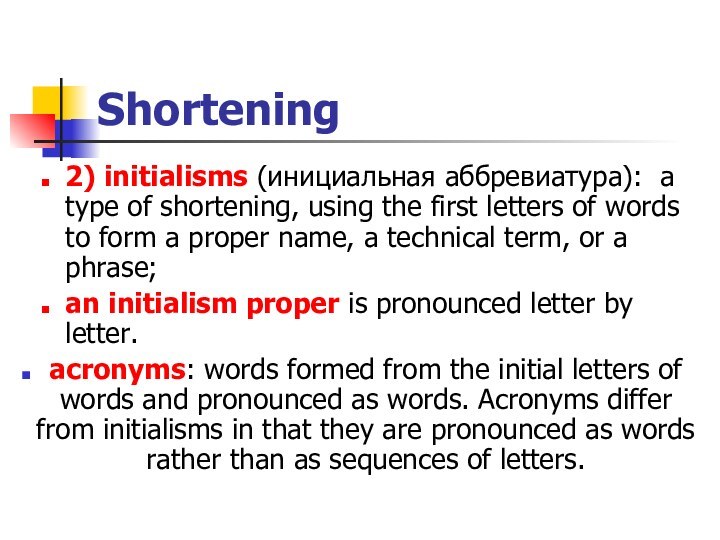

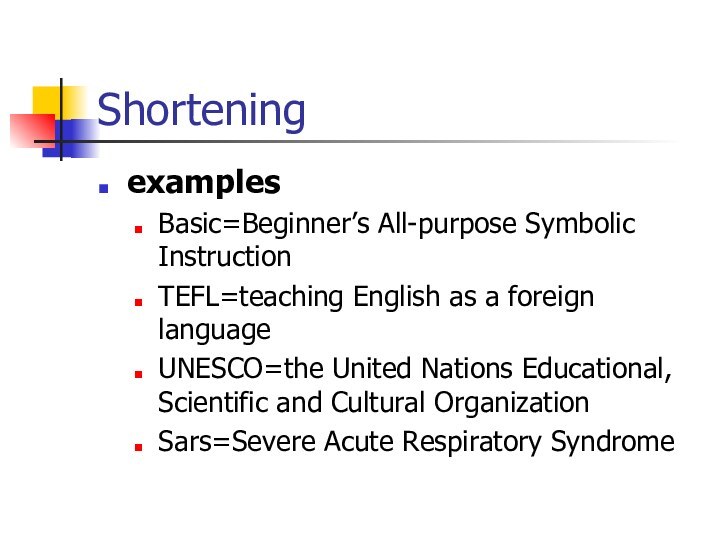


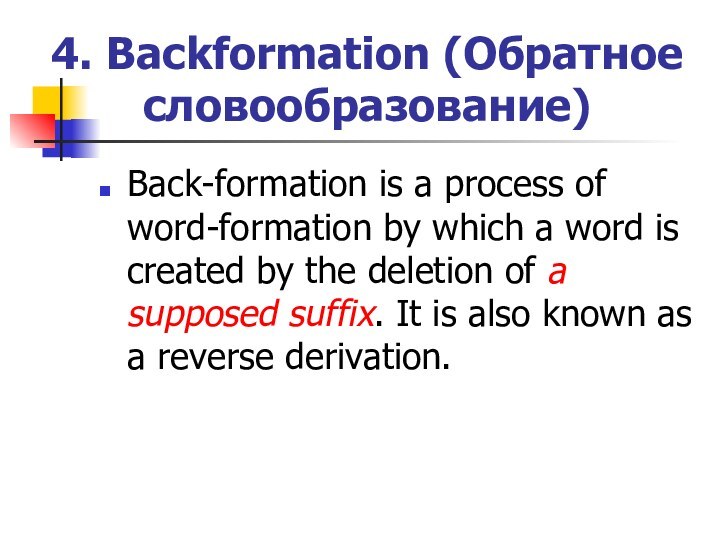
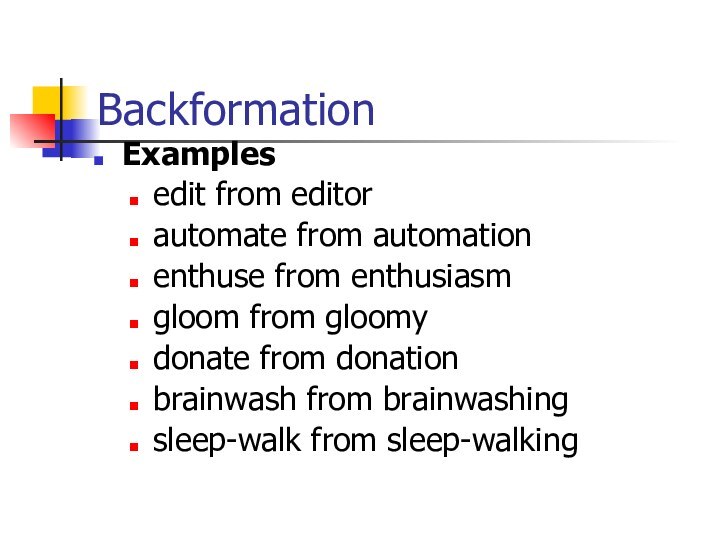
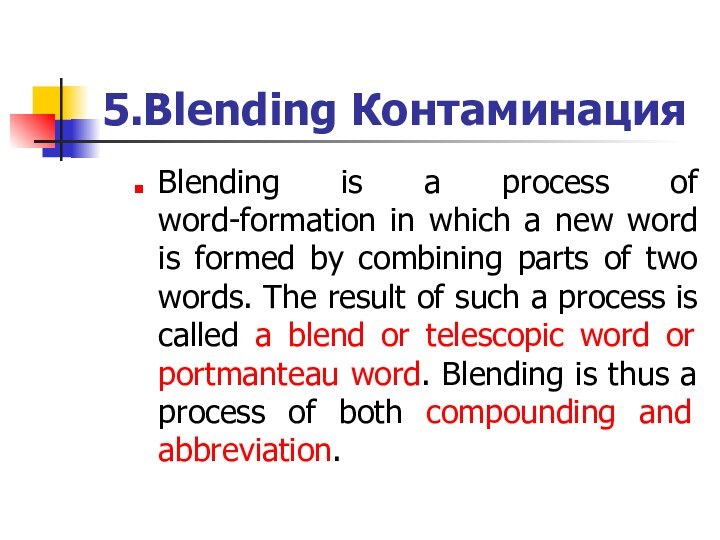


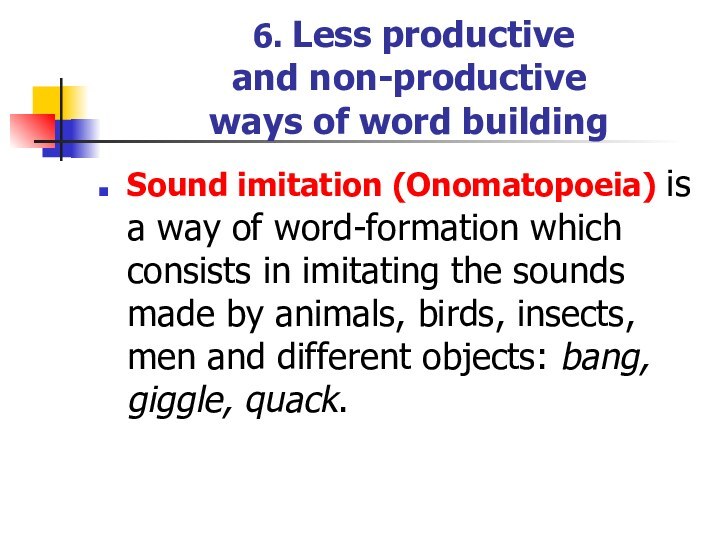




Слайд 3
1. Conversion (zero derivation)
is making a new word
by changing the part of speech characteristics of the
word without changing its morphemic shape.The most productive pattern of conversion (конверсионная модель) is N→V: honeymoon→to honeymoon.
Less productive is the pattern Adj→N: slow→to slow (us. to slow down – сбавлять скорость).
The pattern V→N is much less frequent than the pattern N→V: to fall – a fall.
Слайд 4
Conversion
Noun-verb conversion
He elbowed his way through the crowd.
Problems
snowballed by the hour.
The newspaper headlined his long record
of accomplishments.Kissinger got the plans and helicoptered to Camp David.
Слайд 5
Conversion
Verb-noun conversion
He was admitted to the university after
a three-year wait.
This little restaurant is quite a find.
It
is a good buy.He took a close look at the machine.
Слайд 7
Conversion
Adjective-noun conversion
1. Partial conversion
Denoting a quality or a
state common to a group of person: the deaf,
the blind, the poor, the woundedDenoting peoples of a nation (ending in –sh, -se, -ch): the English, the Chinese, the Danish, the Scotch
Denoting a quality in the abstract: a strong dislike for the sentimental, to distinguish the false and the true, from the sublime to the ridiculous
Denoting a single person (converted from participles): the accused, the deceased, the deserted, the condemned
Слайд 8
Conversion
Adjective-noun conversion
2. Complete conversion
A native, two natives, a
returned native
He is a natural for the job.
Tom is
one of our regulars, he comes in for a drink about this time every night.To them she is not a brusque crazy, but appropriately passionate.
They are the creatives in the advertising department.
Слайд 9
2. Compounding
Compounding or composition
is a word-formation process consisting
of joining two or more bases to form a
new unit, a compound word.It is a common device which has been productive at every period of the English language. Today the largest number of new words are formed by compounding.
Слайд 10
Compounding
Type of composition:
Solid (without linking elements): bedtime, honeymoon
With
linking vowel or consonant: saleswoman, handicraft
With linking preposition or
conjunction: mother-in-law, bread-and-butterSyntactic – by lexicalized phrase: forget-me-not, stick-in-the-mud
Derivational: teenager, blue-eyed, town-planning
Слайд 11
Compounding
Structure of the compounds:
1) two simple stems: pen-knife,
bookcase;
2) one derived stem: chainsmoker, cinema-going;
3) one clipped stem:
B-girl, H-bomb;4) one compound stem: wastepaper-basket.
Слайд 12
3. Shortening (Clipping or Curtailment)
Types of shortening or
abbreviation
1) clipped words: those created by clipping part of
the word (usually a noun), leaving only a piece of the old word. The clipped form is normally regarded as informal.
Слайд 13
Shortening
Clipped words can be of different types:
ad=advertisement
expo=exposition
phone=telephone
pro=professional
memo=memorandum
tec=detective
heli or
copter=helicopter
comfy=comfortable
Слайд 14
Shortening
2) initialisms (инициальная аббревиатура): a type of shortening,
using the first letters of words to form a
proper name, a technical term, or a phrase;an initialism proper is pronounced letter by letter.
acronyms: words formed from the initial letters of words and pronounced as words. Acronyms differ from initialisms in that they are pronounced as words rather than as sequences of letters.
Слайд 15
Shortening
examples
IOC=International Olympic Committee
BBC=British Broadcasting Corporation
ISBN=International Standard Book Number
CAD=computer
assisted design
cm=centimeter
TB=tuberculosis
Слайд 16
Shortening
examples
Basic=Beginner’s All-purpose Symbolic Instruction
TEFL=teaching English as a foreign
language
UNESCO=the United Nations Educational, Scientific and Cultural Organization
Sars=Severe Acute
Respiratory Syndrome
Слайд 17
Shortening
gymnasium
dormitory
handkerchief
gasoline
kilogram
influenza
business
parachute
refrigerator
taxicab
gym
dorm
hanky
Gas
kilo
flu
biz
chute
fridge
taxi or cab
Give clippings for the following
words
Слайд 18
Shortening
CPU
DIY
CEO
IT
AI
SOS
IDD
GMT
VIP
P.S.
a.m.
p.m.
central processing unit
Do it yourself
Chief Executive Officer
Information
technology
artificial intelligence
Save our ship
international direct dial
Greenwich Mean Time
very important
personpostscript
ante meridiem
post meridiem
Write out in full the following initialisms
Слайд 19
4. Backformation (Обратное словообразование)
Back-formation is a process of
word-formation by which a word is created by the
deletion of a supposed suffix. It is also known as a reverse derivation.
Слайд 20
Backformation
Examples
edit from editor
automate from automation
enthuse from enthusiasm
gloom from
gloomy
donate from donation
brainwash from brainwashing
sleep-walk from sleep-walking
Слайд 21
5.Blending Контаминация
Blending is a process of word-formation in
which a new word is formed by combining parts
of two words. The result of such a process is called a blend or telescopic word or portmanteau word. Blending is thus a process of both compounding and abbreviation.
Слайд 22
Blending
Examples
newscast (news+broadcast)
brunch (breakfast+lunch)
smog (smoke+fog)
talkathon (talk+marathon)
slimnastics (slim+gymnastics)
videophone ( video +telephone)
Слайд 23
Blending
sci-fi
hi-fi
workaholic
stagflation
Unicom
sitcom
motel
dawk
science+fiction
high+fidelity
work+alcoholic
stagnation+inflation
United + Communications
situation+comedy
motor+hotel
dove+hawk
Слайд 24 6. Less productive and non-productive ways of
word building
Sound imitation (Onomatopoeia) is a way of word-formation
which consists in imitating the sounds made by animals, birds, insects, men and different objects: bang, giggle, quack.
Слайд 25
Reduplication (Repetition)
consists in a complete or partial
repetition of the stem or of the whole word
(bye-bye), often with a variation of the root vowel or consonant (ping-pong)These words are always colloqual or slang, among them there many nursery words.
1) the words in which the same stem is repeated without any changes (pretty-pretty, goody-goody, never-never (утопия);
2) words with a vowel variation (chit-chat (сплетни), ping-pong, tip-top);
3) words with pseudomorphemes (rhyme combinations) (lovey-dovey, walkie-talkie, willy-nilly); the parts of such words don’t exist as separate words.
Слайд 26
Ellipsis
is the omission of a word or
words considered essential for grammatical completeness but not for
the conveyance of the intended lexical meaning: pub←public house, daily←daily newspaper, sale←cutprice sale, taxi←taximotor cab (ellipsis+apocopy in the last word).
Слайд 27
Non-productive ways of word-building
Sound interchange :
vowel-interchange (to sing
– song, to live – live) and consonant-interchange (use
– to use [z], advice – to advise). Consonant interchange may be combined with vowel interchange: bath – to bathe.Distinctive stress is found in groups like `present – pres`ent, `conduct – con`duct, `abstract – abstr’act, etc. These words were French borrowings with the original stress on the last syllable.
